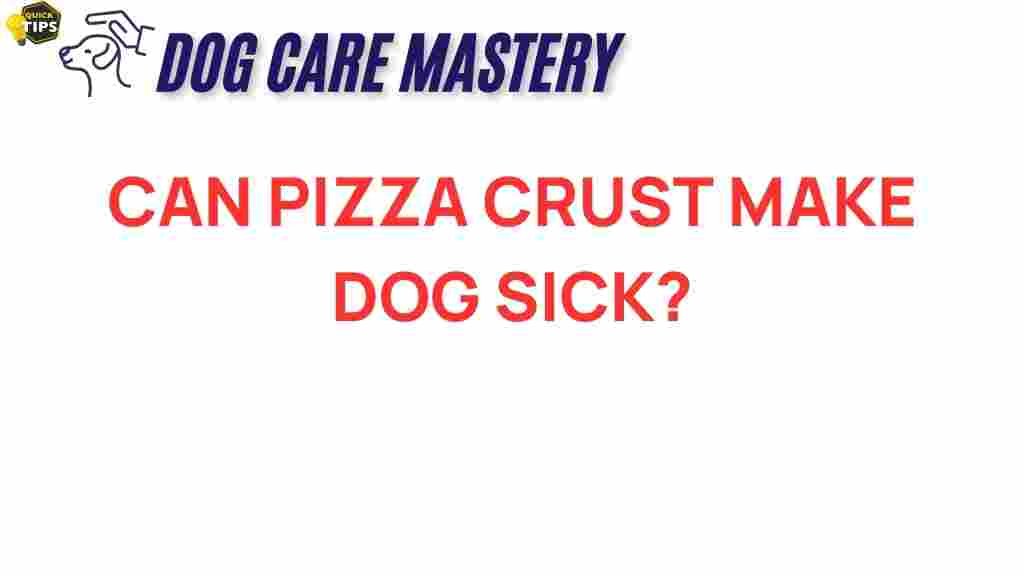Can Pizza Crust Be Dangerous for Your Dog’s Health?


Can Pizza Crust Be Dangerous for Your Dog’s Health?
As dog owners, we often find ourselves sharing our favorite snacks with our furry friends. One popular food item that frequently ends up in dog bowls is pizza crust. But can pizza crust be dangerous for your dog’s health? In this article, we will explore the potential risks associated with pizza crust, whether it is safe for dogs to consume, and what alternatives you can provide to keep your pet healthy and happy.
Understanding Pizza Crust Ingredients
To determine if pizza crust poses a health risk for dogs, we must first understand the common ingredients used in making it. Pizza crust typically contains:
- Flour
- Water
- Yeast
- Salt
- Sugar
- Olive oil or other fats
While some of these ingredients are generally safe, others can be harmful or cause digestive issues for dogs. Let’s delve into the potential dangers posed by these ingredients.
Potential Risks of Pizza Crust for Dogs
Here are some specific concerns regarding pizza crust and your dog’s health:
1. High Carbohydrate Content
Pizza crust is high in carbohydrates, which can lead to obesity in dogs if consumed in excessive amounts. Obesity can result in various health problems, including:
- Joint issues
- Diabetes
- Heart disease
2. Salt and Sodium
Many pizza crusts contain added salt, which is not suitable for dogs in large quantities. Excessive sodium intake can lead to:
- Increased thirst
- Urinary issues
- High blood pressure
3. Yeast and Dough
Raw pizza dough can be particularly dangerous for dogs. If ingested, the yeast can ferment in the dog’s stomach, leading to:
- Abdominal pain
- Bloating
- Potentially life-threatening gastric torsion
4. Allergens
Some dogs may have allergies or sensitivities to certain ingredients in pizza crust, such as wheat or gluten. Symptoms of food allergies in dogs include:
- Itchy skin
- Ear infections
- Gastrointestinal upset
Is Pizza Crust Safe for Your Dog?
The short answer is: it depends. While a small piece of pizza crust may not harm your dog, it is essential to consider the following:
- Moderation is key. A small amount occasionally is less likely to cause issues.
- Monitor your dog for any adverse reactions after consuming pizza crust.
- Consult your veterinarian for personalized advice regarding your dog’s diet.
Alternatives to Pizza Crust for Dogs
If you’re looking for safe and healthy alternatives to pizza crust for your dog, consider the following options:
- Whole Wheat Bread: In small amounts, plain whole wheat bread can be a healthier alternative.
- Vegetable Snacks: Carrots, green beans, and sweet potatoes are nutritious options.
- Commercial Dog Treats: Look for treats specifically formulated for dogs.
For more healthy snack ideas for your dog, check out this comprehensive guide.
Step-by-Step Process: What to Do If Your Dog Eats Pizza Crust
If you suspect your dog has consumed pizza crust, follow these steps:
- Assess the Amount: Determine how much pizza crust your dog has eaten.
- Check for Ingredients: If the crust contained harmful ingredients (like garlic or onion), take immediate action.
- Observe Your Dog: Watch for any signs of distress or discomfort, such as vomiting, diarrhea, or lethargy.
- Contact Your Veterinarian: If your dog shows any concerning symptoms or if they ate a large quantity, consult your vet.
Troubleshooting: Common Concerns and Questions
What if My Dog Shows Signs of Allergies?
If you notice signs of allergies after your dog eats pizza crust, such as itching or gastrointestinal upset, discontinue giving them pizza crust and consult your veterinarian for advice on managing food allergies.
Can Dogs Eat Other Parts of the Pizza?
While the crust is a common concern, other pizza components like cheese, sauce, and toppings can also pose risks:
- Cheese: Some dogs are lactose intolerant, and cheese can lead to digestive upset.
- Tomato Sauce: Some sauces contain garlic or onions, which are toxic to dogs.
- Toppings: Certain toppings like mushrooms or processed meats can be harmful.
Conclusion
In conclusion, while pizza crust may not be inherently dangerous for your dog, it is essential to be cautious about the ingredients and the quantity consumed. High carbohydrate content, added salt, and potential allergens can pose health risks to your furry friend. Always prioritize moderation and monitor your dog for any adverse reactions. If in doubt, consult your veterinarian for tailored advice.
Ultimately, there are many safe and nutritious alternatives to pizza crust that you can offer your dog. By making informed choices about your dog’s diet, you can help ensure they remain happy and healthy for years to come.
For further reading on dog nutrition, check out this informative resource.
This article is in the category Safety and created by dogcaremastery Team
Recent Posts
What to Feed a Dog with Sickness and Diarrhea: Expert Insights
Discover what to feed a dog with sickness and diarrhea for optimal recovery and health.
Unraveling the Mystery: How Many Hours Does a Dog Sleep?
Discover how many hours a dog sleeps and what it reveals about canine behavior and…
The Fate of Our Furry Friends: Does a Dog Die in The Walking Dead?
Discover the fate of a dog in The Walking Dead and explore its impact on…
Unveiling the Signs: How to Recognize a Dog Dying from Heartworms
Heartworms pose a serious threat to dog health. Discover the symptoms indicating a dog may…
Unraveling the Mystery: Why Does My Dog Twitch in His Sleep?
Discover why your dog twitches in sleep and what it reveals about canine health and…
Mastering Outdoor Sleep: How to Train Your Dog Beyond the Crate
Discover effective ways to train your dog to sleep outside the crate for a more…